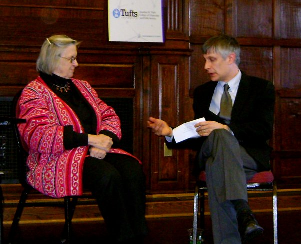- Facebook324
- Total 324
I am in Chicago for meetings at the National Conference on Volunteering and Service and then the Spencer Foundation. The last time I was here, it was to speak at the Chicago Donors Forum conference on community engagement. The Forum’s report on the conference is well done. The best parts are quotes from other speakers, such as Agustin Flores, age 19, who stole the show with a great talk about the life-changing experience of challenging Mayor Rahm Emanuel over student transportation fares. But I’m quoted, too:
“Community engagement is just as important as education, criminal justice, or urban development, because we cannot tell what to teach, what should be illegal, or how to develop a community without engaging people.” …
“There are no panaceas, no silver bullets; and community engagement doesn’t work for all purposes,” said Peter Levine. “But there are great examples of impact.” Perhaps the most powerful example in these hard economic times is how active community involvement and political engagement lead directly to greater economic success, fending off unemployment and creating conditions for the acquisition of jobs—in the city, the region, and the state.
“We found a correlation between social capital or civic health in states and major metropolitan areas and their resilience against unemployment, once various economic factors were controlled,” Levine said. He outlined the chain of benefits communities derive from active engagement:
“Participation in civil society can develop skills, confidence, and habits that make individuals employable and strengthen the networks that help them to find jobs.”
“Middle school and high school students who participate in service-learning during class or who serve in school government succeed much better academically than peers with similar backgrounds. Many individuals owe their employment to fellow members of social or civic groups or have learned their most marketable skills in national and volunteer service.”
“Trust is a powerful predictor of economic success because people who trust are more likely to enter contracts and business partnerships, and because confidence in others is a precondition for investing and hiring.”
“Communities and political jurisdictions with stronger civil societies are more likely to be governed well. Active and organized citizens can demand and promote good governance and serve as partners to government in addressing public problems.”
“Community engagement can encourage people to feel attached to their communities, increasing the odds they will invest, spend, and hire there. A related hypothesis holds that the strength of local civic infrastructure, such as the availability of civically committed religious congregations, and the availability of local associations and informal venues such as barber shops, boosts attachment and investment in a community, which in turn increases civic engagement and local economic investment.”
“I am a community engagement guy,” said Levine, expressing confidence that subsequent studies will find that community engagement translates into gains in health and environmental protection as well as economics. “I have studied and practiced that my whole career. I happen to believe that a full and flourishing human life requires community engagement.”
